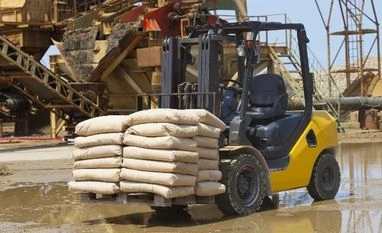UltraTech Cement, India's largest cement maker with a capacity of 93 million tonnes, has delivered a weak set of numbers for the July-September quarter as it is in the process of completing one of country's biggest acquisitions - Jaypee Cement's 21.2 million tonne unit. Higher depreciation and interest cost related to acquired units dented UltraTech's profitability during the period, which is the first operating quarter post acquisition.
The Aditya Birla group firm posted a decline of 31 per cent in consolidated net profit at Rs 423 crore from Rs 614 crore a year ago. Its consolidated net sales, however, rose to Rs 6,840 crore from Rs 5,708 crore, up 20 per cent.
Though profits were down on a year-on-year basis, UltraTech beat street estimates by nearly 12 per cent. Bloomberg had estimated the cement major to report a net profit of Rs 377 crore, but UltraTech did much better. Also, Q2 of the current fiscal is not strictly comparable to the previous corresponding quarter due to addition of acquired units.
Shares of UltraTech, after a weak start, rules firm in the second half of the trading session till the announcement of the results and touched an intra-day high of Rs 4,180 on the BSE. However, it last traded at Rs 4,090.75, ending the day flat.
In a statement, the cement giant said, "Increased depreciation and higher cost relating to the acquired cement plants resulted in a PAT of Rs 423 crore as compared to Rs 614 crore in Q2FY17. This quarter continued to witness increasing cost trends, attributable to increase in fuel prices."
It is worth noting that the unis acquired from Jaypee will enhance UltraTech's footprint in high growth markets in the central region, Himachal Pradesh, eastern Uttar Pradesh and coastal Andhra Pradesh. The firm had completed the Rs 16,189 crore acquisition in June this year.
UltraTech has injected some much needed working capital as the three-month period ended September was the first quarter of operations post-acquisition. "The most critical aspect has been to improve and stabilise the quality of cement being manufactured at these plants and bringing it up the company's standard," said UltraTech.
It added that the acquisition was completed with the onset of monsoons and acute shortage of sand in most of the markets impacted performance. UltraTech is now focused on increasing its presence in the newly acquired markets and ramping up sales.
Kumar Mangalam Birla, chairman of Aditya Birla group, had hinted to shareholders in UltraTech's 17th annual general meeting in July that the Jaypee acquisition may have a long gestation period. He had said, "We need to turn around the Jaypee plants. We may take 3-4 years to turn around these assets. It was one of the largest deals in India and we need to digest it now."
However, analysts do not see UltraTech's Q2 show as a major concern. According to Reliance Securities, the company's numbers are not comparable with the year-ago quarter due to addition of the acquired capacity. "However, EBIDTA per tonne at Rs 957 in a challenging environment augurs well considering the initial pain from the ramp of new acquired units. It is certain that UltraTech will continue to manage a decent operating performance in the medium term despite the initial higher cost on ramping up of new acquired units. We maintain our positive view on the company," added a report from Reliance Securities.
The company has approved an investment of Rs 194 crore on Wednesday for a wall care putty plant to cater to the rising demand for the building material. The unit is expected to be commissioned in the second quarter of FY20.
In its outlook, UltraTech said that government's spending on infrastructure, rural and affordable housing will be the key demand drivers and that the company is well positioned to cater to the demand.
To read the full story, Subscribe Now at just Rs 249 a month
Already a subscriber? Log in
Subscribe To BS Premium
₹249
Renews automatically
₹1699₹1999
Opt for auto renewal and save Rs. 300 Renews automatically
₹1999
What you get on BS Premium?
-
Unlock 30+ premium stories daily hand-picked by our editors, across devices on browser and app.
-
Pick your 5 favourite companies, get a daily email with all news updates on them.
Full access to our intuitive epaper - clip, save, share articles from any device; newspaper archives from 2006.
Preferential invites to Business Standard events.
Curated newsletters on markets, personal finance, policy & politics, start-ups, technology, and more.
Need More Information - write to us at assist@bsmail.in
)